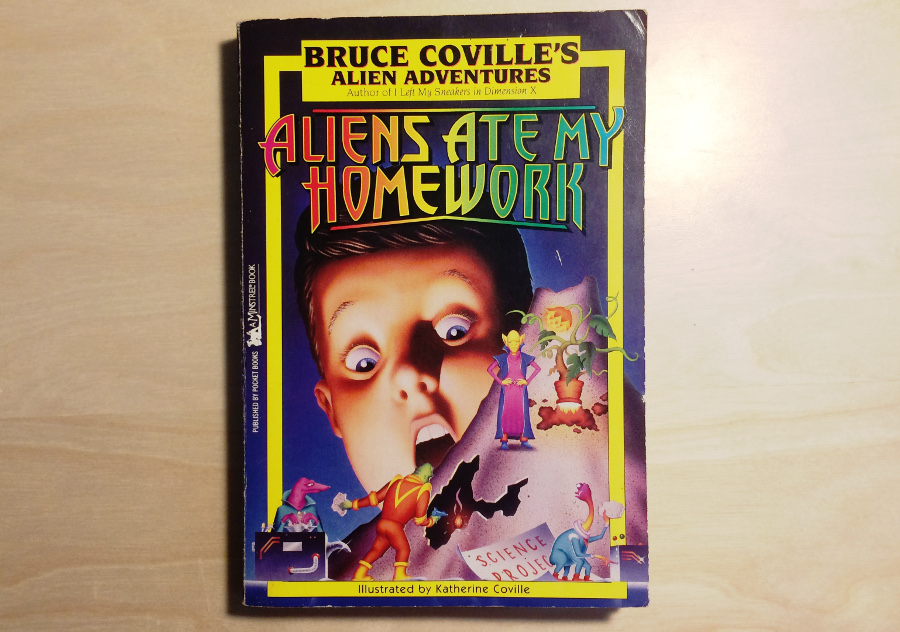Books of My Childhood
Aliens Ate My Homework
Posted 05 Nov 2016
If you’d asked me who my favorite author was at the age of eight or nine, I’d have replied without hesitation: “Bruce Coville!” Mr. Coville’s specialty was works of science fiction and fantasy, usually with a dash of humor. He wrote numerous different series (some of which we may cover in the future) but my favorite by far was the “Alien Adventures,” beginning with Aliens Ate My Homework.

The Aliens series follows a small cast of alien characters perennially in pursuit of the evil intergalactic criminal BKR. Along for the ride is our hapless protagonist, Rod Allbright, a middle-school-aged kid who narrates the adventures in first-person.
Rod’s primary character trait is pathological honesty: he always tells the truth, no matter what. This is kind of a strange choice for a character quirk, but Coville manages it quite skillfully. Rod’s honesty becomes a driving factor in the plot, frequently creating narrative tension when he can’t comfortably lie about the bizarre circumstances he finds himself in. This becomes particularly pronounced at the climax, at which point Rod has to learn to lie in order to save the day. It’s a conceit that easily could have fallen flat, but Coville uses it as the engine that drives Rod’s character, and does so admirably.
Rod is primarily a viewpoint character, though. He himself is barely developed, and exists primarily as a shell through which the reader can enter the story. This is a common storytelling technique, and a very effective one. Its effectiveness is the primary reason that stories like these so often include a “fish out of water” character like Rod. Rod experiences the story in the same way that the reader would, and in doing so makes the tale more vividly accessible.
Rod’s alien cohorts are developed somewhat more than he is. There’s Grakker, the cantankerous captain (who looks like a green gorilla). Madame Pong is the crew’s motherly diplomat and sole female. Snout is a wise mental master. Tar Gibbons is a martial artist. Phil is a talking plant. Each of the aliens is charmingly distinct, and I distinctly recall as a kid liking all of them. Reading it now I wish they could have been built up a bit more, but with less than 200 pages there’s admittedly not enough room to fully develop five additional characters. (They will be explored in greater depth in the rest of the series, of course.)
In terms of science-fictional themes, there’s nothing really original here, but there are a lot of ideas that were new to me when I read it as a kid. One such detail that particularly stands out is the fact that Tar Gibbons belongs to a species with more than two sexes (and is itself neither male nor female), a concept which I found fascinating, and completely believable, as a kid. Other concepts in the book include parapsychology, biological mutualism, mood-altering mental implants, androids, and additional spatial dimensions. These ideas are familiar to any adult science fiction reader, but as a kid it was all new and enthralling to me.
But what surprised me most when rereading it as an adult was the relationship between Snout and Grakker. These two characters, both male, are explicitly depicted as being in a romantic relationship. And yet Coville handles it so subtly that not only did it completely escape my notice as a kid, but it apparently escaped the notice of censorship-happy adults too: I have yet to see Aliens Ate My Homework on any list of banned books. The most explicit clue is the fact that Snout and Grakker share a bedroom, but a careful reading provides many additional hints about the intimate nature of their relationship. It’s an astonishingly progressive detail for a book of this age group, and one originally published in 1993. The relationship is handled with complete acceptance, and so I, as a kid, accepted it without a second thought. It’s a testament to the openness of children, and the power of good children’s literature.
The aliens’ culture built on humanism (or whatever the equivalent interspecies term would be), principles of trust and cooperation that have allowed them to build a better society. They are dismissive of Earth as a backwater planet still in the thrall of backwards social policies. Like Star Trek, Coville’s universe contrasts our current era with a greater and better future to be found in the stars. The Alien Adventures series shares Star Trek’s incurable optimism, a refreshing change from the tropes of hostile aliens and horrific dystopias, which even in children’s fiction are commonplace.
Aliens Ate My Homework was a joy to revisit. The characters are quirky and interesting and the story solid and engaging. The ideas don’t pack the punch they once did for me, but the whole thing is executed with such humor and genuine affection that it doesn’t matter. It’s not a book for adults in any sense, but it’s a shining example of good science fiction for kids.